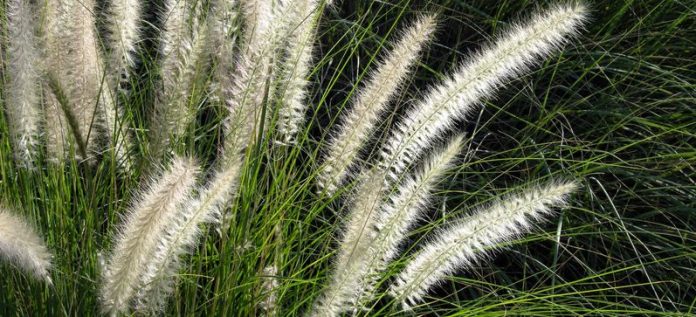Ornamental grasses may be grown in your garden amongst the flowers or clumped in an open space for a natural effect and to add a vertical dimension.
If you decide to add them to a flower garden, choose the type carefully, for some are extremely invasive and others may cast unwanted shade over your flowers.
Ornamental grasses differ from lawn grass in that frequent mowing weakens and eventually kills them.
They can be small, clumping ground covers like blue fescue or the popular mondo grass, or stately spires like Chinese Silver Grass, towering to 20 ft.
Some, like Red Switch Grass, have beautiful fall color. For a grass with strong colors try Imperata cylindrica Rubra. It has tallish straplike blades of deep burgundy mixed with a green that is almost jade.
Tall grasses can be stunning used as a single specimen in the middle of the lawn, or in a landscape with trees and rocks.
Most grasses have few diseases or pests to worry about and nothing could be easier to care for, so, if you are pushed for time or not into major gardening, ornamental grasses may be the ideal solution.
The beauty of many grasses is not only in their leaves but the seed. Often seed is born in tall spires above the clump and not only hangs on for months, but offers food to birds and insects.
Pennisetum villosum has soft and fluffy seed heads in the late summer, while the delicate feathery seed heads of Stipa calamagrostis will last right through to fall.
Stipa gigantea is a larger variety as the name suggests. Many seed heads last for ages when picked and dried and make wonderful indoor decorations.
Many grasses also have flowers that are attractive, like Melica uniflora, which has tiny, beadlike flowers borne on slender, arching spikes.
It requires shade to grow well and looks fantastic teamed with ferns. Some grasses like Lamarckia aurea, are annuals. This one has unusual downswept flower spikes.
Shorter grasses can also be used for borders and edgings, enclosing pretty annuals within a green framework.
Blue fescue grown with black mondo grass can give an unusual and effective, yet, extremely simple appeal in a small garden if grown in a checkerboard pattern.
Use the grasses alone, with small, clumping annual flowers or even squares of white pebbles to give a lift.
Phalaris arundinacea Feeseys Form, the less common variety of gardeners garters, has a white stripe down the center of the leaf that makes it most attractive.
Many woodland grasses thrive in heavy shade in spite of the root competition of overhanging trees, because this is similar to their natural habitat, so if you have a spot that is difficult to grow flowers in, think in terms of grasses instead.
Warning! Ribbon Grass, though beautiful, is one of those that are extremely invasive. Plant it in a bottomless container to prevent it spreading.
Red Baron or Japanese Blood Grass, so called for its beautiful coloring also spreads, but is not so invasive as Ribbon Grass.
Lemon grass, while not madly attractive, can be picked and steeped in boiling water for a calming tea.
There are many other beautiful ornamental grasses for the garden other than those mentioned above. The only trouble is in deciding which ones to leave behind.

